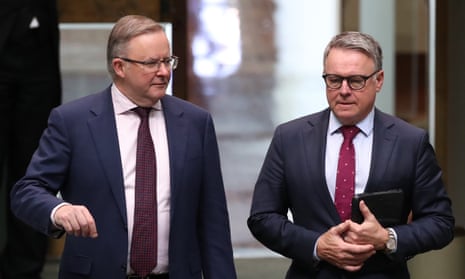A public battle between Anthony Albanese, Mark Butler and Joel Fitzgibbon over Labor’s language regarding gas has triggered a process whereby the ALP has agreed to support new gas projects, subject to environmental approvals and reaching net zero emissions by 2050.
The brawl was triggered when the shadow resources minister, Joel Fitzgibbon, publicly endorsed the taxpayer underwriting of new gas infrastructure championed by one of Scott Morrison’s most influential business advisers, Nev Power, before seeing any of the specifics.
Fitzgibbon’s endorsement of underwriting resulted in a public rebuke from Butler, the shadow climate change minister, and Albanese, the federal Labor leader who told Guardian Australia: “I speak for the Labor party and the Labor’s party’s position is we examine things based upon the detail.”
The rolling row triggered an internal process with a working group of the shadow cabinet, comprising Fitzgibbon and fellow rightwingers Richard Marles and Don Farrell along with Butler and fellow leftwingers Penny Wong and Pat Conroy, to negotiate a form of words acceptable to all.
Those words were put to the shadow cabinet during the long weekend in October and were signed off as talking points.
Guardian Australia understands the agreed talking points state Labor supports the gas sector in recognition of the role it plays in creating economic growth and export earnings; in jobs retention and job creation; in the provision of feedstock and heating to manufacturers; in electricity generation; in firming renewables in the national energy market; and the provision of heating and cooling to households.
The talking points state gas has an important role to play in achieving Labor’s target of net zero emissions by 2050, and commit the party to support new gas projects subject to environmental approvals and consistent with achieving the net zero target.
The document contains language critical of the government’s “gas-led recovery” and says Australia’s economic recovery after the pandemic must capitalise on the huge potential of renewables in the energy sector, energy-intensive manufacturing and new and emerging industries, creating a pathway to net zero emissions by 2050.
It says firming power, including gas generation, will be critical to capitalising on renewable energy opportunities, and Labor supports policy settings to encourage investment at least cost.
The talking points state Labor recognises the potential of carbon capture and storage in the gas industry, and it supports gas-intensive manufacturing industries such as chemical and fertiliser production, including policies to help those industries grow and create jobs.
The language is designed to span Fitzgibbon’s desire that Labor be more assertive backing blue collar workers in traditional industries and Butler’s desire that policy support for energy sources be consistent with Labor’s policies on climate change.
The locutions in the talking points reflect some of the language about gas in Labor’s draft policy platform revealed by Guardian Australia in September.
Fitzgibbon’s front running of Labor’s policy debates has some support in the right faction and with some unions. One senior figure supportive of Fitzgibbon complained on Thursday night that the talking points had been agreed but not sufficiently utilised after the shadow cabinet decision.
But some in Fitzgibbon’s right faction and many leftwing MPs in the caucus are furious with the shadow resources minister’s campaigning and positioning. Some regard the campaign as principally about holding his Hunter Valley electorate rather than Labor’s electoral fortunes at the national level.
The main focal point of the internal fight within Labor is not about gas, but about setting a medium-term emissions reduction target for 2030. Fitzgibbon has threatened to quit the shadow cabinet if the opposition adopts a target he regards as being too ambitious.
As part of building his campaign, Fitzgibbon invited the leadership of the Australian Workers Union and the construction and mining union to Canberra to brief MPs earlier this week. Senior officials Tony Maher and Daniel Walton addressed between 30 and 40 Labor MPs urging them to defend blue collar workers in traditional industries or face losing another election to the Coalition.
